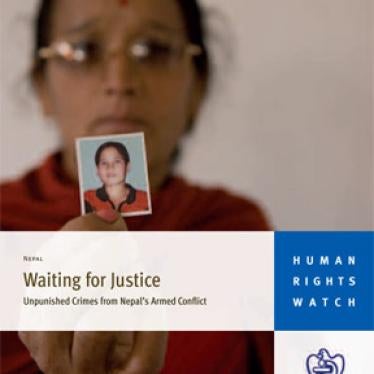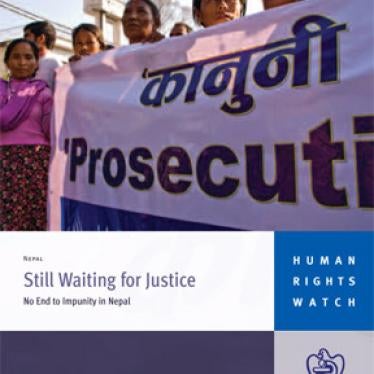July 16, 2010
Re: Support Civilian Criminal Proceedings against Army Major for Wartime Abuse
Dear Leaders of all Political Parties Represented in the Constituent Assembly:
We are seeking your intervention to ensure that the Nepal Army immediately hands over Major Niranjan Basnet, implicated in the 2004 murder of 15-year-old Maina Sunuwar, to police custody so he is held accountable through civilian criminal proceedings. The army claims to have disciplined several soldiers for human rights violations following investigations in military courts. However, three others accused in Sunuwar's death were given only six-month sentences for minor offenses. This raises serious concerns about whether military trials of members of the armed forces and other state officials accused of serious human rights violations such as murder and torture can be trusted to meet international human rights standards.
Major Niranjan Basnet, who had been serving as a peacekeeper in Chad, was returned to Nepal on December 13, 2009, after the UN discovered that in January 2008 the Kavre District Court had charged him and three others with the illegal detention, killing, and torture of Maina Sunuwar. He has never appeared before the court to face these charges, and was allowed to join the peacekeeping mission by Nepal's government in September 2009 despite the pending charges. Upon his return, the army, which has previously defied court orders and shielded Major Basnet from prosecution, took him under its control.
On July 14, 2010, the results of the Nepal Army internal investigations were announced. According to press reports, Major Basnet was found "innocent," and had been returned from the UN mission "against all international norms and regulations." Without giving reasons, the defense ministry has endorsed this decision despite strong evidence that came out during the investigations themselves implicating Major Basnet in the case.
In his own statement during military investigations into Maina Sunuwar's death (which has now been made available to the Kavre court), Major Basnet admitted that he was party to the illegal detention and interrogation of a minor. He admitted that he was a member of the arresting party and brought Maina, age 15, to an illegal detention center in the army barracks. There were no female police officers present during Maina's detention and interrogation. This, in itself, contravenes international standards and best practice guidelines on treatment of female detainees.
Major Niranjan Basnet's admissions recorded by the military inquiry go further. He admitted that he was witness to the torture, stating: "I had seen the general inquiry and pouring water from the head. I did not see any other methods. As regards giving electric shock, it was not correct. It should not be done.... I think she might have died due to water pouring, giving shocks etc. the methods used during interrogation."
He has also admitted that after discovering that Maina had died in custody due to torture, he was assisted in filing a false police report claiming that she was a Maoist combatant who was shot and killed while trying to escape custody. He said: "[The colonel] ordered Amit to make arrangements for the burial of the corpse. He asked Amit to fire bullets before burying the body. I went to the police post and brought the police. Then colonel told the police: ‘[W]e were bringing a Maoist; she jumped off the vehicle and attempted escaping in Hokshe area and died in the action.' ...Then, we all stayed quiet."
There is other direct eyewitness evidence concerning Basnet's involvement in Maina's death. Captain Sunil Prasad Adhikari who was there during parts of the interrogation, in a statement to the court martial, said: "He [Basnet] was present during the time of the interrogation. And he was directly involved at times (e.g. in ordering extra water and in relation to asking questions)." Colonel Bobi Khatri, the commanding officer at the barracks who ordered Maina's interrogation, stated that "Major Niranjan Basnet was also involved in the interrogation of his own free will." Captain Adhikari confirmed that, in his opinion, Maina died directly as a result of the torture inflicted on her during interrogation. Colonel Khatri's admitted to the court martial that he was aware that repeated ducking of Maina's head in water for up to one minute at a time could lead to death, but claims that he lacked the intention to kill Maina.
Despite these admissions, the court martial inquiry has found Major Basnet innocent because they say he was operating under a section of the Army Act designed to cover the situation where a soldier is engaged in direct combat with an enemy and has good reasons for believing that his own life or the lives of others is under immediate threat of death or injury. It is hard to understand how Major Basnet and other soldiers could have been immediately threatened by an unarmed 15-year-old girl. The Nepal Army has refused to produce its officers before the Kavre District Court, claiming they have already been tried by the court martial. On May 10, 2010, the district court passed fresh orders against the "absconding" defendants, seizing their inherited properties.
Maina Sunuwar's killing took place during the decade-long conflict ending in 2006 between Maoists and government forces, in which over 13,000 people died. Despite a peace agreement, followed by elections, not a single person has been prosecuted in civilian courts for serious human rights abuses during the armed conflict.
The army claims to have brought to trial several soldiers for human rights violations following investigations in military courts. However, three others accused in Sunuwar's death were given only six-month sentences for minor offenses; which in the end they were not required to serve. In any event, international standards require that violations against civilians be dealt with before civilian courts.
The Nepal Army's continuing argument that trying the four officers before a civilian court would be a breach of the principle of double jeopardy has no basis. This issue has already been dealt with by the Supreme Court in September 2007, when it reviewed the court martial judgment and thereafter decided to refer the matter to the Kavre District Court. If the Nepal Army does not agree with this decision, it should appeal to a full bench of the Supreme Court. The Nepal Army has no authority to decide on this matter.
The Maina Sunuwar killing has become a test case for justice in Nepal. We urge you to ensure that all the perpetrators are brought before a judge and properly prosecuted. The Nepal Army is under civilian control, and the government should exercise its authority and order that Basnet be turned over to police custody immediately.
As negotiations on the formation of a new government are progressing, it is critical that you ensure that all political parties involved renew the commitment set out in the Comprehensive Peace Agreement to bring an end to impunity and provide accountability for past human rights violations. Perpetrators of torture and murder should have no space to hide, and the rule of law and independence of the judiciary should be restored.
The new government should also urgently review its procedures for selection of security forces' personnel to be deployed on peacekeeping duties to ensure that no one against whom there is prima facie evidence of involvement in grave human rights violations is deployed.
Thank you for your attention to these matters, and we look forward to an opportunity to discuss these matters further.
Sincerely,
Meenakshi Ganguly Mandira Sharma
South Asia director Director
Human Rights Watch Advocacy Forum







